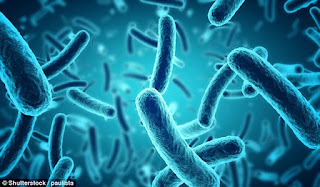Antioxidants known as polyphenols in Montmorency cherries, which are grown in the US, encourage the survival and reproduction of so-called good bacteria (stock)
What does ape dung tell us about human health?
This comes after research released last May suggested the faeces of apes implies humans are deficient in fibre.
A lack of fibre during certain periods of the year causes apes to produce more of a specific bacteria that breaks down the protective mucous layer in their guts, a study found.
Study author Dr Brent Williams, from Columbia University, said: 'Many humans may be living in a constant state of fibre deficiency.
'Such a state may be promoting the growth of bacteria that degrade our protective mucous layer, which may have implications for intestinal inflammation, even colon cancer.'
The researchers are thought to have analysed apes over humans due to the primates being our closest living relatives, as well as such studies being easier to carry out on animals.
Results suggest apes' microbiomes change with the seasons, alongside their diets, with certain gut bacteria being more predominant during summer, when they eat fruit, compared to winter, when their main food source is fibrous leaves and bark.

Comments
Post a Comment